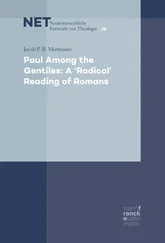Charles Gore - St. Paul's Epistle to the Romans - A Practical Exposition. Vol. II
Здесь есть возможность читать онлайн «Charles Gore - St. Paul's Epistle to the Romans - A Practical Exposition. Vol. II» — ознакомительный отрывок электронной книги совершенно бесплатно, а после прочтения отрывка купить полную версию. В некоторых случаях можно слушать аудио, скачать через торрент в формате fb2 и присутствует краткое содержание. Издательство: Иностранный паблик, Жанр: foreign_religion, foreign_antique, foreign_prose, на английском языке. Описание произведения, (предисловие) а так же отзывы посетителей доступны на портале библиотеки ЛибКат.
- Название:St. Paul's Epistle to the Romans: A Practical Exposition. Vol. II
- Автор:
- Издательство:Иностранный паблик
- Жанр:
- Год:неизвестен
- ISBN:нет данных
- Рейтинг книги:5 / 5. Голосов: 1
-
Избранное:Добавить в избранное
- Отзывы:
-
Ваша оценка:
- 100
- 1
- 2
- 3
- 4
- 5
St. Paul's Epistle to the Romans: A Practical Exposition. Vol. II: краткое содержание, описание и аннотация
Предлагаем к чтению аннотацию, описание, краткое содержание или предисловие (зависит от того, что написал сам автор книги «St. Paul's Epistle to the Romans: A Practical Exposition. Vol. II»). Если вы не нашли необходимую информацию о книге — напишите в комментариях, мы постараемся отыскать её.
St. Paul's Epistle to the Romans: A Practical Exposition. Vol. II — читать онлайн ознакомительный отрывок
Ниже представлен текст книги, разбитый по страницам. Система сохранения места последней прочитанной страницы, позволяет с удобством читать онлайн бесплатно книгу «St. Paul's Epistle to the Romans: A Practical Exposition. Vol. II», без необходимости каждый раз заново искать на чём Вы остановились. Поставьте закладку, и сможете в любой момент перейти на страницу, на которой закончили чтение.
Интервал:
Закладка:
In the quotations from the Old Testament, with which the section concludes, we notice that St. Paul varies the original application of the passages from Hosea. In the prophet they refer to the recovery of dejected and dishonoured Israel , while the apostle applies them to the exaltation of the Gentiles from their low estate. As is often the case, while other passages in the prophets were there to prove exactly what he wanted 41 41 e. g. Isa. xix. 24; Ezek. xvi. 55. (The exaltation into the fellowship of the chosen people of Egypt, Assyria, Sodom, and Samaria.)
, St. Paul takes the words which come into his mind with a considerable latitude of application, and without any critical argument. Thus, if he makes somewhat free with the particular texts, it is in order to vindicate the real teaching of the Old Testament. He has, if not exact criticism, what is much better, profound spiritual insight.
The passages quoted from Isaiah are characteristic and central. This great prophet first clearly perceived that most striking law of human history – that progress comes, not mostly through the majority of a nation, but through the faithful remnant. It is the few best through whom alone God can freely work. It is the best who in the long run determine the moral level of the nation, and either keep the mass of men around them from corruption, or, if that is impossible, provide a fresh point of departure and hope in a society now inevitably, as a whole, hastening to decay and judgement. 'As a terebinth, and as an oak, whose stock remaineth, when they are felled; so the holy seed is the stock thereof 42 42 Isa. vi. 13.
.'
DIVISION IV. § 3. CHAPTER IX. 30-X. 21.
Lack of faith the reason of Israel's rejection
What is to be our conclusion then? That Gentiles, men beyond the pale of God's covenant, who made no pretension of pursuing righteousness, all at once laid hold on righteousness and made it their own, simply by accepting in faith the divine offer which came their way; while Israel, the chosen people, devoted to pursuing a law of righteousness, never caught up with that of which it was in pursuit. The result seems strange enough. But the reason of it is apparent. Israel 43 43 I have endeavoured sometimes in this analysis to expand what St. Paul means by 'pursuing righteousness,' by 'works' and by 'faith,' in accordance with the meaning already assigned to these words; see vol. i. pp. 7-24.
had been put under a divine election, which required of them the open ear, the responsive will, of faith. But instead of cultivating this temper of faith, they fastened upon the specified observances of the Mosaic law, and blindly adhered to them, as if God had nothing deeper or greater to teach them, and they had nothing deeper or greater to receive. Thus, when the Christ came, with His completer light and claims, they would not have Him. They wanted nothing further, nothing more than they were accustomed to. And thus Isaiah's prophecy was fulfilled, that the Christ, the tried foundation stone, the destined security of all who should believe in Him, would turn out to be a stone at which the chosen people should stumble, and a rock on which it should meet disaster 44 44 Isa. viii. 14; xxviii. 16. Cf. Matt. xi. 6.
(ix. 30-33).
And here is the pathos of the situation. Here is what puts passion into St. Paul's desire and his prayer for Israel's entrance into the great deliverance. It is that they have such a real zeal for God, though without any spiritual insight to guide it. A real zeal for God! of that St. Paul's own experience qualified him to testify. But in what sense without insight? In the sense that with Jesus of Nazareth there appeared a divine righteousness, which God was communicating to men 45 45 See above, vol. i. p. 17.
; but the Jews, preoccupied with maintaining a standard of righteousness which they had taken for their own – which had become identified, that is to say, with their own self-satisfaction and pride of privilege and independence of interference – failed to perceive the divine purpose, and, in fact, refused to submit themselves to it. For that principle of law which the Jews had come to regard as God's final word, He really intended only as a temporary discipline to be brought to an end by the coming of the Christ, and by the disclosure of the real righteousness which, in Christ, God should offer and man should simply accept in faith. Law and faith are in sharp and intelligible contrast. Under the law of works a man, as Moses says 46 46 Levit. xviii. 5.
, stands to preserve his life (or save his soul) according as he performs the specified requirements (as if man were an independent being who could thus stand over against God on his merits). But faith, attributing nothing to itself, simply accepts the offer of God, the divine message of compassion brought near to it. Moses of old told the Israelites 47 47 Deut. xxx. 11-14. I have italicized the words substantially reproduced by St. Paul, but I have quoted the whole passage because its whole meaning is in his mind.
that the commandment was not too hard for them, neither was it far off. It was not in heaven, that they should say, who shall go up for us to heaven, and bring it unto us, and make us to hear it, that we may do it? Neither was it beyond the sea, that they should say, who shall go over the sea for us, and bring it unto us, and make us to hear it that we may do it? But the word was very nigh unto them, in their mouth and in their heart , that they might do it. These words really describe the character of the Christian message of faith, of which the apostles are the heralds. Truly there is no need for the believer in Jesus to seek some one to scale heaven to reach a remote God, for Christ is come down. Or to descend into the abyss to seek a Christ dead and lost, for Christ is risen. The great deliverance is offered to us on very easy terms. A man has only openly to confess that the human Jesus is really the divine Lord, and heartily to believe that God raised Him from the dead. Let him heartily accept that message, and the fellowship in the divine righteousness is his. Let him publicly confess that creed, and the great salvation is open to him. It is the old teaching of Isaiah 48 48 Isa. xxviii. 16.
– if a man but believe (in the Christ) there is no fear of his being put to shame. And here Jews and Greeks are all on the same level of need and opportunity. There is over all the same Lord Christ, with the same inexhaustible good will towards all who simply call on Him. Again the old scripture testifies that it is every one who calls on the name of the Lord who shall be saved 49 49 Joel ii. 32.
. The conditions then are very simple. To call on the Lord, we may say, men must believe in Him. To have the opportunity of believing on Him, they must have heard about Him. To hear about Him, they need one to speak in His name. And how can men speak in the name of God except as His apostles, as men commissioned and sent from Him? And these terms we know well enough have all been fulfilled. The commissioned heralds of the good tidings of God have gone forth, so that all men may hear and believe and call out to God. Truly Isaiah's vision of the welcome preacher of good tidings 50 50 Isa. lii. 7.
is realized to-day (x. 1-15).
Now we have clear before us the simplicity of the gospel, the message to faith. And we have before us the plain fact that the Israelitish people, preoccupied with their own temporary and misunderstood standard of the law, have not generally accepted it. But this is no more than Isaiah led us to expect. 'Lord,' he cries, 'who gave credence to our message 51 51 Isa. liii. 1.
?' (Faith, you see, according to the prophet, requires just a listening to a divine message; and this message has come to men by the preaching about Christ.) And can it be pleaded that the Jews have not had the opportunity of hearing the message? No, truly, as the Psalmist says, the voice of God's messengers has gone over all the earth, and their words to the end of the inhabited world 52 52 Ps. xix. 4.
. Or can it be said that Israel did not know that a preaching to the Gentiles was to be looked for? No, a succession of warnings had reached them. Thus Moses foretold that it should be a nation which (religiously speaking) was no nation, a people without understanding, that God would use to provoke His people to jealousy, and stimulate their emulation 53 53 Deut. xxxii. 21.
. Again, Isaiah uses startling words, and declares that God has been discovered by those who never sought Him, and revealed to those who never asked for Him 54 54 Isa. lxv. 1, 2.
– that is the Gentiles. But the words of Isaiah that follow describe truly the relation of God and Israel. God has tenderly and persistently been offering His love to them, but they have proved themselves only rebellious and full of contradiction (x. 16-21).
Интервал:
Закладка:
Похожие книги на «St. Paul's Epistle to the Romans: A Practical Exposition. Vol. II»
Представляем Вашему вниманию похожие книги на «St. Paul's Epistle to the Romans: A Practical Exposition. Vol. II» списком для выбора. Мы отобрали схожую по названию и смыслу литературу в надежде предоставить читателям больше вариантов отыскать новые, интересные, ещё непрочитанные произведения.
Обсуждение, отзывы о книге «St. Paul's Epistle to the Romans: A Practical Exposition. Vol. II» и просто собственные мнения читателей. Оставьте ваши комментарии, напишите, что Вы думаете о произведении, его смысле или главных героях. Укажите что конкретно понравилось, а что нет, и почему Вы так считаете.












